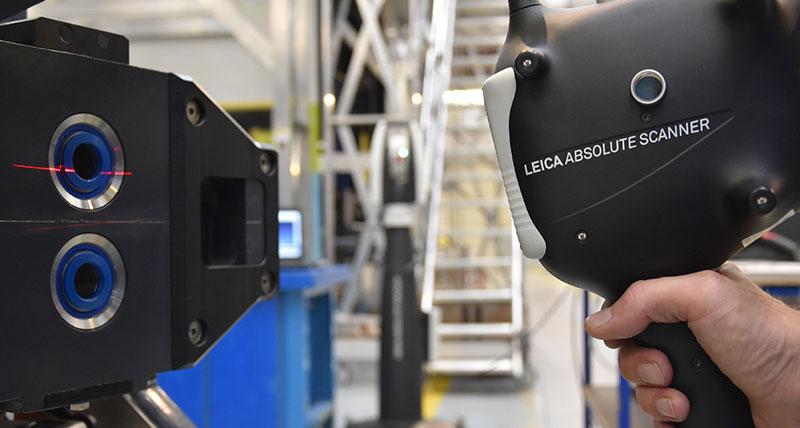In high-stakes industries like aerospace and automotive, precision isn't a luxury—it's a necessity. Whether you're manufacturing aircraft fuselages or car chassis, there’s no room for error. That’s why more companies are relying on laser tracking equipment to raise the bar for quality control.
These advanced systems aren’t just accurate—they’re fast, adaptable, and ideal for complex, large-scale components. If you’re looking to boost your inspection capabilities or simply curious about how laser technology fits into modern manufacturing, you're in the right place.
Let’s dive into why Laser Tracking Equipment is a game-changer for quality control.
What Is Laser Tracking Equipment?
Laser tracking equipment is a portable 3D measurement tool that uses laser beams to precisely capture the position and movement of an object. Unlike traditional inspection methods, which can be slow or limited in range, laser trackers allow engineers to measure large parts with sub-millimeter accuracy in real time.
In other words, they’re like a super-precise tape measure on steroids—but way cooler and way more powerful.
The Growing Need for Accuracy in Aerospace and Automotive
In both aerospace and automotive sectors, tolerances are shrinking while customer expectations are growing. A tiny alignment issue in a fuselage or a misfit in a vehicle frame can lead to catastrophic consequences—or at the very least, major production delays.
That’s why precision is everything. And the demand for non-contact, highly accurate measurement tools has never been higher.
Why Traditional Methods Aren’t Enough
Calipers, micrometers, and coordinate measuring machines (CMMs) have served their purpose—but they’re not ideal for measuring large components or complex assemblies quickly.
Laser tracking equipment, on the other hand, makes it easy to:
-
Measure big parts in one go
-
Get instant results
-
Avoid manual data entry errors
-
Perform checks directly on the shop floor
That level of flexibility is something older tools just can’t match.
Enhanced Quality Control in Aerospace Applications
Aerospace manufacturers face some of the strictest quality standards on the planet. Whether it’s assembling wings, landing gear, or fuselage sections, every millimeter matters.
Laser trackers allow aerospace teams to:
-
Align structural components with unmatched precision
-
Verify tooling and fixtures instantly
-
Monitor changes during assembly
-
Improve the accuracy of first article inspections (FAI)
This leads to fewer errors, tighter builds, and a significant boost in production confidence.
If you're curious about how laser tracking equipment in aerospace keeps production flawless, this industry case study is worth checking out.
Laser Tracking in Automotive Manufacturing
Speed is the name of the game in automotive, but not at the cost of quality. That’s where laser tracking systems come in handy—especially for verifying body-in-white assemblies, frame alignment, and robotic positioning.
In automotive plants, laser trackers help teams:
-
Ensure body panels and frames fit perfectly
-
Monitor real-time alignment on production lines
-
Calibrate robots with ultra-high accuracy
-
Detect and correct deviations instantly
And since the equipment is mobile, it can be moved directly to the line without interrupting production.
Faster Inspections and Turnaround Times
Time is money in manufacturing. Traditional inspection methods can be slow and labor-intensive. But laser tracking tools dramatically cut inspection time—often from hours to minutes.
Here’s how:
-
Measurements are taken in real-time
-
Fewer setup changes are needed
-
Results are instantly recorded and analyzed
This speed not only improves quality control but also reduces costly downtime. That’s a win-win for everyone.
Real-Time Data and Digital Documentation
Laser tracking equipment doesn’t just measure—it collects valuable digital data. This means every measurement is logged, analyzed, and stored automatically.
Why does that matter?
-
You get real-time feedback on process quality
-
You can spot trends before they become problems
-
You have full traceability for audits and compliance
In regulated industries like aerospace, this kind of documentation is priceless.
Easy Integration with CAD and Automation
Laser tracking systems seamlessly integrate with your CAD models. This lets you compare real-world measurements to digital blueprints in real time.
Plus, they play well with automated production systems. For example, you can use them to:
-
Calibrate robotic arms
-
Guide CNC machines
-
Align jigs and fixtures
That kind of synergy makes your entire workflow smarter and more efficient.
For deeper insights on integrating laser tracking equipment into automated manufacturing, this automation article is a great resource.
Portability and Versatility on the Shop Floor
One of the biggest perks of modern laser trackers? They're portable.
Unlike bulky CMMs or stationary inspection stations, you can wheel a laser tracker anywhere in your facility. Whether you're checking a tool, verifying a component, or running a spot inspection, laser trackers give you unmatched flexibility without compromising precision.
This portability means faster response times and more freedom to inspect on the fly—without halting operations.
Reducing Rework and Scrap
Rework kills productivity. It eats up time, drains resources, and impacts delivery schedules. By using laser tracking equipment, manufacturers can catch alignment and tolerance issues before they become big problems.
Fewer defects mean:
-
Less wasted material
-
Lower labor costs
-
More reliable final products
And let’s not forget—fewer customer complaints, too.
Meeting Compliance and Certification Standards
Whether it’s ISO, AS9100, or IATF 16949, maintaining certification in aerospace and automotive industries requires rock-solid quality control. Laser tracking equipment supports compliance by providing traceable, verified measurement data.
This helps your team:
-
Pass audits more easily
-
Document every step of your QC process
-
Stay aligned with regulatory standards
And in industries where reputation matters, this level of assurance is worth its weight in gold.
Final Thoughts: Why Precision Matters More Than Ever
From jet engines to electric vehicles, the future of manufacturing demands higher standards and faster production. And laser tracking equipment delivers both.
By enhancing accuracy, improving traceability, and accelerating inspection times, these systems are quickly becoming a must-have for any forward-thinking manufacturer.
So if you're looking to elevate your quality control game, investing in laser tracking equipment isn’t just smart—it’s essential for staying competitive in today’s fast-moving world.



